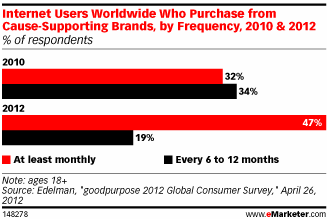Businesses try and put themselves in situations where encouraging the public to form positive opinions of their brands are organic, honest and second nature. For this reason, companies have aligned themselves with charitable causes for many years, and businesses have noticed a positive impact on their bottom lines when promoting societal causes.
The urge to buy from companies that actively participate in great social purposes poses an ethical question – should marketers promote their brands’ good nature as a means to increase profit margins or, at the very least, brand engagement? While highlighting charitable efforts in order to rake in revenue can be viewed as shady, marketers shouldn’t shy away from speaking on their involvement in their communities and across the country.
According to public relations company Edelman, consumers prefer to buy products or services from brands that are socially aware. The report noted that, between 2008 and 2010, about 42 percent of American internet users were more likely to purchase from companies that had social initiatives, than from organizations that didn’t promote their causes. In 2012, Edelman found that the figure jumped 11 percent to 53 percent.
What’s more, consumers are buying from cause-supporting companies more frequently. In 2010, approximately 67 percent of respondents bought products or services from brands at least once a year. That metric remained steady 66 percent in 2012. However, nearly half of Edelman’s respondents noted that they bought from societal businesses monthly in 2012 – compared to only 32 percent who engaged with brands with the same frequency in 2010.
 Marketers shouldn’t exploit their social agendas, but they can cover their efforts in thought-provoking and newsworthy blog content. While brands often think of content marketing as a straightforward sales practice, subtly hinting that readers should buy, news content marketing is an effective practice and these articles help build and support trust. According to The Custom Content Council, 79 percent of marketers report that their companies are shifting their agendas toward branded content. More, 52 percent of respondents outsource some portion of at least one content type to third-party agencies.
Marketers shouldn’t exploit their social agendas, but they can cover their efforts in thought-provoking and newsworthy blog content. While brands often think of content marketing as a straightforward sales practice, subtly hinting that readers should buy, news content marketing is an effective practice and these articles help build and support trust. According to The Custom Content Council, 79 percent of marketers report that their companies are shifting their agendas toward branded content. More, 52 percent of respondents outsource some portion of at least one content type to third-party agencies.
Business owners who want to spread the word about their societal practices can do so in a trustworthy and honest way through news content marketing. Similar to public relations media, website content is a transparent way to inform audiences of extracurricular activities, without running the risk of treading in unethical waters.




